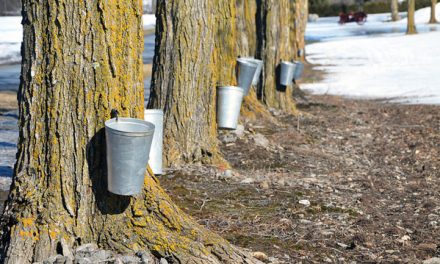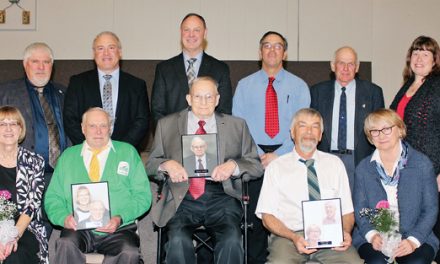by Kalynn Sawyer Helmer
AgriNews Staff Writer
PERTH – Three years ago, when Kemptville College closed their doors, eastern Ontario lost a major agricultural education hub. Without the school, students had to travel to Guelph, Quebec and outside of the Ottawa Valley for their educations. For some students, agricultural dreams were put on hold if the few agricultural programs did not accept them. Seeing the struggle first hand was what made Keith Bean from the Ottawa Valley get involved.
It began with meetings with the local Chamber of Commerce. Promoting the return of an agricultural school to Kemptville was the original idea until he and a few others approached Algonquin College. The idea had been thrown around before and with the help of Bean and his peers, has finally grown into a reality.
Starting in the fall of 2019, agricultural students will return to eastern Ontario in the Agribusiness course at the Perth Algonquin College Campus. Students will be able to start applying to the program as of October 2018. The program, a two-year business course, will feature small class sizes in a rural setting to help maintain the students’ lifestyles.
“It’s not going to teach students how to grow crops or raise cattle or anything. What it is going to teach them is the business of agriculture. We’re going to teach them what you would normally learn in a two-year business program but all of the examples are going to be from agriculture,” explained Bean. “So, in accounting they will use actual accounting for a farm. When the students are finished if they go back to run a farm or work for an agribusiness, they will understand how the numbers works, what kind of returns you should have and how to finance things, how to write a business plan and how to be a leader.”
In order to achieve approval for the program from the Ministry, a program advisory committee and some Algonquin faculty spent two years in consultations with the public, stakeholders and researching the best curriculum for the students.
“What we have done is consult very extensively, not just with the stakeholders that came to us but also with dozens of industry stakeholders. We’ve used the survey from the Ottawa Farm Show and then we’ve recruited what we feel are top notch program advisors to help us design a curriculum. What everybody has told us is that they wanted more business education in an agriculture program,” said Martin Savard, faculty and lead program development.
The program meets the Ministry approved provincial standard for business while integrating agriculture into the classes. “There is going to be a combination of straight business introduction classes like accounting, computer systems, sales and marketing and economic issues. As well as technical courses that touch on soils, farm safety, animal health, crop production, dairy production and legislation. Then there are a lot of courses that put it all together. Accounting for agribusiness or a business plan course where students put together a five year plan for a new or current operation based on what they’ve learned,” said Savard.
Instructors will be brought in from across the agricultural industry, with leading experts teaching the students how to succeed when running a farm or working in the service sector of agriculture. “We will teach them about different grants available and how to apply, working with the milk marketing board to improve their business, leadership and how to look after themselves,” said Bean.
Unlike other programs in which the school runs a farm on the campus, the Agribusiness Program will instead visit farms and companies to get a wider array of experiences. “At first when we started to talk to the industry and said we couldn’t have a farm, we thought maybe that was going to be a draw back, but everybody really sees that as a strength. We will constantly have access to new technology, constantly have access to a variety of ways to operate a farm or operate a service business, so we intend to take the students to producers in order to cover those topics,” explained Savard.
Having just received approval and funding from the Ministry, work is underway to finalize the program. What is needed, Savard and Bean agreed, are more industry partners. The program intends to have a coop aspect, so organizers hope to attract as many producers and industry businesses as possible. Savard said anyone involved in the agriculture business is encouraged to reach out. “Seed consultants, financial planners and advisors, banks, producers, equipment manufactures and sales, any business that supports the industry,” he said.
As well as the coop option, Bean and Savard said they hope to find as many partners as they can for hands-on learning days and guest lecturers. “We really need to get our industry partners on board. We want to be able to show the students the latest and greatest. Like the GSP systems and how you download them to improve yields for next year and who you work with to get your soil perfect. We want to expose them, give them a lot of contacts and launch them into the industry,” said Bean.
For those interested in becoming a partner, Bean can be contacted at keithbean@beancars.ca. The program advisory committee is made up of industry professionals who operate their own farms while working in the service sector. The committee includes: Keith Bean – PAC chair / Bean Chevrolet Buick GMC Ltd., Deb Knapton – Ontario Federation of Agriculture, Blair Dow – Algonquin College, Paul Crozier – BMO, Jeremy Nixon – Nixon Farms, Mark Nelson – Oakhurst Farms, Rick Schouten – Corner View Farms, Lois James – Ottawa Valley Seed Growers Association, Shelley McPhail – Agricorp, Bryan Brydges – Toprock Farms, Steve Holmes – Agromart, Harry Bennet – Harvex, Scott Weagant – Weagant Farm Supplies and Doug Savage – Holstein International.











